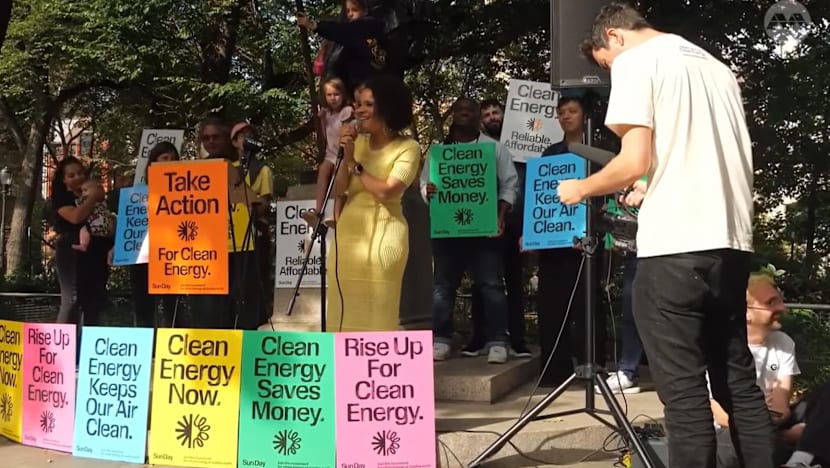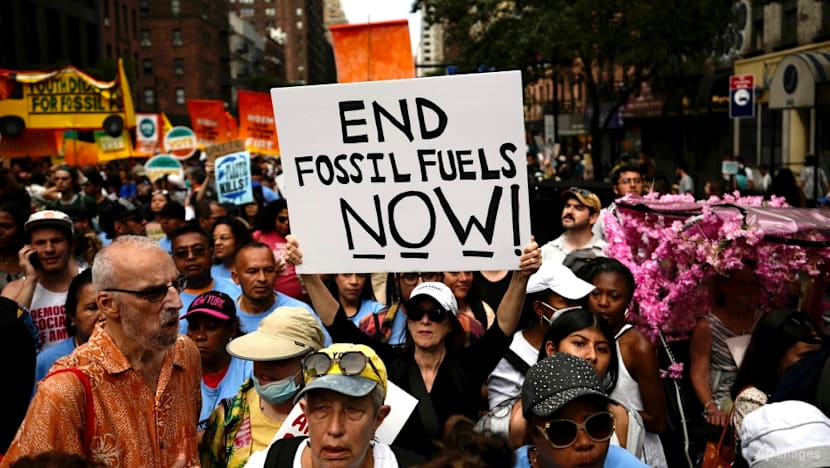US climate activists shifting from mass marches to targeted campaigns, say experts
US President Donald Trump recently dismissed climate change as a “con job”, fuelling frustration among environmental advocates.

The “Sun Day” climate event held in New York City on Sep 21, 2025.

This audio is generated by an AI tool.
NEW YORK: Climate activists in the United States are shifting away from mass demonstrations to smaller localised, targeted events aimed at everyday concerns like jobs and energy costs, according to analysts.
The movement is entering a new phase that focuses less on moral outrage and more about practical solutions, they noted.
At a “Sun Day” climate event in New York City in September, crowds gathered not to block roads or chant slogans, but to celebrate clean energy.
The shift comes amid political polarisation, with US President Donald Trump recently dismissing climate change as the “greatest con job” in the world – a stance that has fuelled frustration among environmental advocates.
Vermont Democratic Senator Peter Welch criticised Trump’s policies at the New York event, saying they slash green jobs, cut clean energy tax credits and raise costs for families and businesses.
“He's taking jobs away from our kids. He's taking jobs away from our communities. And we are not going to take it,” he said.
REFRAMING THE ISSUE
For many activists, the goal now is to reframe climate change as a tangible and economic issue that resonates beyond traditional environmental circles.
Among them is renowned environmentalist Bill McKibben, who helped organise the “Sun Day” initiative. He said the campaign spurred around 500 events across the US to “celebrate” the power of clean energy.
“It's now the obvious, commonsense, straightforward way to power the planet,” he told CNA.
The approach marks a shift from the massive climate marches and disruptive, attention-grabbing events of recent years.
Instead of focusing on abstract moral appeals, activists are linking climate action to bread-and-butter issues – including electricity bills and employment.
“You've got to figure out what meets the moment,” McKibben noted.
“But when there are opportunities to reach out to people and say, here is a way forward that will save you money and that will help the planet, then seize it. There's no reason not to.”
FROM PROTESTS TO POLICY
The broader climate community is also changing tack.
For example, in April, American think tank Council on Foreign Relations launched its Climate Realism Initiative, focusing on national security and economic threats posed by climate change.
Meanwhile, billionaire philanthropist Bill Gates has urged a pivot from focusing on rising temperatures to tackling poverty and disease as part of the fight against climate change.
Carolyn Kissane, a clinical professor at New York University’s Center for Global Affairs, said she believes part of the reason for this strategic shift is the lack of clear messaging in earlier movements.
“(These) protest moments became opportunities for a portfolio of grievances,” added Kissane.
“And as the number of grievances in sort of one protest moment multiplied, then the message got diluted. There was no clear message because there were multiple messages.”

She pointed out that disruptive acts – like throwing paint on artworks or blocking traffic – alienated potential supporters.
A new approach could also be required to make an impact with the Trump administration and his supporters, she said.
GROUNDS FOR OPTIMISM
Despite political setbacks, Kissane said the outlook is not entirely bleak.
Businesses and local governments across the US are taking action to reduce emissions and invest in renewables, even as federal politics remain divisive.
With the 30th United Nations Climate Change Conference (COP30) kicking off in Brazil this week, UN Secretary-General Antonio Guterres warned that the planet has failed to keep global warming within 1.5 degrees Celsius – a clear signal that change is urgent.
Activists said they hope that by changing their approach to climate action, they can have a greater impact than in the past.
















